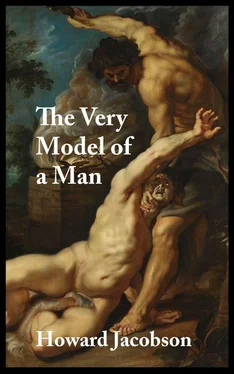Hearing the word pottage, Sisobk’s stomach lurches. ‘Funny,’ thinks Sisobk, coming round, that a cook as inventive as Esau should arrive home tired from the fields one morning and swap his birthright for a platter of his brother’s gruel. Sisobk gets home tired himself some mornings, and he wouldn’t know a fricassee from a flambé — but there’s always an egg!
Sisobk listens to more commotion in his stomach, then discovers it isn’t his stomach but his prophetic soul. Something is wrong. He has missed Cain. Let him go by while thinking about food. He tightens the strings around his parchment footwear, winds his robes around himself as though for flying, and pads off in the direction of Cain’s lodgings. Shortly before arriving at which he finds Zilpah lying motionless, legs a trifle crooked, eyes open, skin irresolute, a bundle of narrow bones not so much discarded as disposed.
Walking away from her, back pitilessly turned, is Cain. Sisobk calls after him, cries, shouts, appeals, but gets no reply.
He kneels, sure that all the kneeling he has done in life has been but a dream of this. He takes her hand. Puts a thumb on the blue tracery of her narrow wrist. He has never said it before, but he will say it now. ‘I love you,’ he says. ‘I love you more than all the world — the world that was, the world that is, and the world to come.’
His eyes crumple and ooze, like raisins that have been trodden on. A tear trickles down his cheek. Others follow, brown and gummy. They stain his face, gather like dewdrops in his smear of a moustache, and at last fall on to the forehead of the stricken woman.
That about does it for Zilpah. ‘Do you know who I am?’ she says, uncrooking her legs, gathering her things, and rising. ‘Do you know who you’ve been addressing? You clown!’
Sisobk falls where she’d fallen, like a man stoned.
13. Cain Refuses Dominion over the Kingdom of Sin
I have said that I missed admiration. That I mourned the passing of praise. That I longed to be marvelled at again. I now repudiate these charges against myself. What I needed was a fight.
There weren’t enough of us. You cannot locate an enemy, raise an army and appoint an adjudicator when there are only five of you — four, once God went moonlighting and left us unattended. And there was no dispensing with an adjudicator. When I say I needed to fight, I mean I needed to win; and when I say I needed to win, I mean I needed to be seen to win.
So perhaps it comes back to being marvelled at, after all.
My father was violent but had no fight in him. He still from time to time recalled the old thunderous scaremongering filched from on high — I have spoken. But it ended, as always, with his sitting sulking underneath a tree. If he no longer closed his hands to illustrate a frightful finality, that was because they had become too bruised in the service of carpentry to close. He was an impatient man. If the tool was not near, by means of which he wished to drive home a dowel or a rivet, he used his fist.
You would have thought, in that case, that I might have been able to coax a contest out of him. But the fist was precisely the problem. He either employed it or he didn’t. He either promptly won or promptly lost. He had no instinct for sparring. For strategy. For attrition. For guerrilla tactics. For satisfying, in short, the frictional necessitudes of a growing boy for whom no provisions as to marriage or fornication had been made. He had no aptitude for friendship either, which would have served as well.
Not bad, he said when I showed him the mischief I was hatching in my garden. Very nice.
Not bad? I had been experimenting with parasitic fungi and cankers. I was enjoying spectacular success with carnation rust, getting those insipid pastels to yellow and then brown. Let the gentlest wind blow and the air in my garden was thick with copper-coloured spores. Leaf by leaf, I was rotting nature. Very nice?
All right, he said, when I drew his attention to the precise character of my ambitions — all right, he said, then not very nice.
He couldn’t have been easier about it.
He was too much of a boy himself to be a father. I don’t mean that he looked young. The bitter battle with my mother had dulled the shine that once sat on his skin. You no longer looked at him and wondered how he could ever have been modelled out of base materials. Now you could see their traces — the peat, the particles, the salts, the mineral striations, the clouded water. He might live for another thousand years but he had rounded that corner from youth to age; he wasn’t a gleaming apparition any more, he did not seem to have been dropped here from another planet, he resembled the earth he trod on. But he was a boy in this way: he was still hoping for something for himself; he needed to be marvelled at as much as I did. He could not do for me what had not been done for him. And he could not be a father because he had not finished — let us be fair about this: he had never even begun — being a son.
I could see, as he walked among my strangulated blooms, that he had no eyes for what was around him. They were not his. He had not made them. He could not be praised for them. I did not then, and I do not now, call this selfishness or egoism. It was more a sort of hysterical blindness, occasioned by loneliness and sensations of shame. What did not proceed from his hands or his desires simply was not visible to him. The necessity he felt to be the cause of pleasure used up all his senses. He strained his hearing, he wore out his sight, he put a permanent twist in his neck, expecting appreciation. And like the rest of us, he was disappointed. For him, too, there were not enough of us. We were too few. And because we all wanted, we were none of us — except my mother at Abel’s bath time — free to give.
A more revelatory, less obfuscated God might have made his life easier. A man needs a Father he can see. Whether they enjoy cordial relations is not the point. The important thing is palpability. There are other views on this matter. Some argue that incorporeality is of the essence. I speak only of what I saw in my father’s case. His bad, unassisted dreams. The melancholy that never left him, not even when he was busy building penfolds, or tearing down forests to erect bridges over rivers we could paddle across. The heartbreaking prayers he had once or twice tried to lead us in but now practised in solitude, great sobbing psalms lamenting One Who Wasn’t There, Who Never Answered, Who Never Would Be There, Who Never Would Answer — the certainty of failure at last becoming an end in itself, a vindication, so that the music swelled into a triumphancy of despair. Rejoice, we are ruined!
A tin god would have served him better. A tumble of roughly carved rocks, with sticks for arms, that he could at least have kissed.
Do you have no feelings about it, I asked him, one way or the other? Meaning, my garden. Meaning, whether what I was doing in it was nice or not nice. Meaning, whether I was nice or not nice.
Should I have?
Yes, I said. I think you should. I think it would be good for me to know your opinion.
My opinion? (He laughed.) I can’t see you taking any notice of that. (I was wayward — we were all wayward — that was his explanation, his excuse, for leaving us to our own devices. No prizes for guessing from Whose example he learnt this disingenuous stratagem.)
I might take notice of it, I said. And I might not. What matters is that there should be something I can make that choice about. It’s possible I have to know what you think precisely so that I can oppose it.
He looked around. It was infinitely touching to see him really trying to use his eyes. To discover what I was up to. To discover who I was. I could feel how hard it was for him. How much it hurt his brain. I could see the pain, starting from his temples, like a bone that had suddenly become dislodged. If I’d been a better son, I wouldn’t have put him through this. Good sons don’t ask anything of their fathers. Not even the time of day.
Читать дальше











